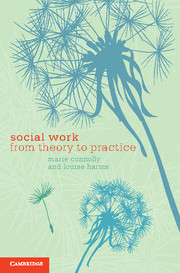Book contents
- Frontmatter
- Contents
- List of figures
- Preface
- Acknowledgements
- 1 Social work knowledge, theory and practice
- 2 Frameworks, models and practice
- 3 Ecosystems theories
- 4 Onion-peeling theories
- 5 Faulty-engine theories
- 6 Story-Telling Theories
- 7 Mountain-moving theories
- 8 Reflective practice and theory
- Concluding thoughts
- References
- Index
Preface
- Frontmatter
- Contents
- List of figures
- Preface
- Acknowledgements
- 1 Social work knowledge, theory and practice
- 2 Frameworks, models and practice
- 3 Ecosystems theories
- 4 Onion-peeling theories
- 5 Faulty-engine theories
- 6 Story-Telling Theories
- 7 Mountain-moving theories
- 8 Reflective practice and theory
- Concluding thoughts
- References
- Index
Summary
AS SOCIAL WORKERS, we continually build understandings of practice that are theoretically and experientially informed. Despite occasional disciplinary uncertainty about whether we actually have a theoretical knowledge base underpinning our practice, the social work profession has a long tradition of theorising. Writers have drawn upon a range of important perspectives, and social workers across a range of settings have used them to inform work with clients. Even though many of these theories that are used by social workers have not originated from within the discipline, in applying a social work interpretative lens, we will argue that they have become distinctly social work practice theories. How they become social work practice theories is an important focus of this book.
Social work is fundamentally concerned with both people and the interactions with their environments, so it involves bringing together theories of the inner worlds and outer worlds in which we live. Some social workers will be drawn to inner world theories, such as psychodynamic approaches, that focus on individual and familial systems. Others will prefer outer world theories that influence structural inequalities and disadvantage. Whether social workers are drawn to inner or outer world theories, the influence our unique disciplinary lens creates theoretical responses that reinforce key disciplinary concerns so that theories are responsive to the needs of the people we work with and address broader social justice issues.
- Type
- Chapter
- Information
- Social WorkFrom Theory to Practice, pp. xi - xivPublisher: Cambridge University PressPrint publication year: 2011



